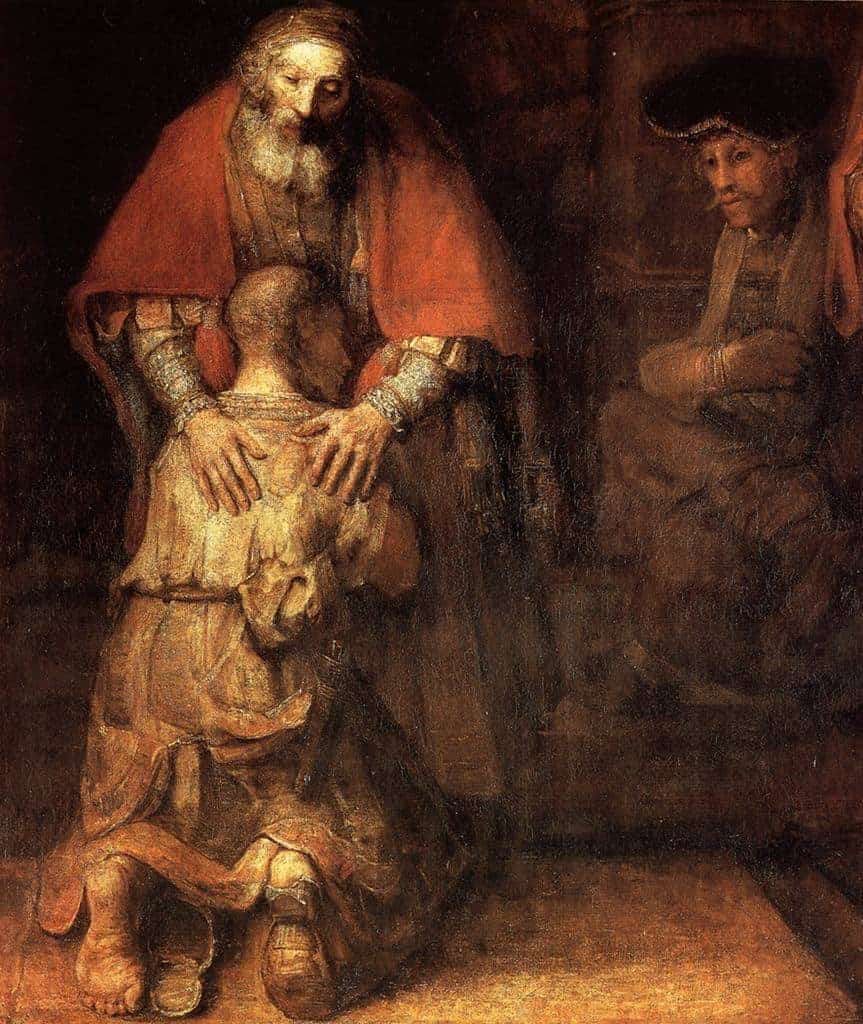
But while he was still far off, his father saw him and was filled with compassion.
Luke 15:20
A lot of people have heard of “the parable of the prodigal (i.e., wasteful) son.” Some translations call it “the parable of the lost son,” which is better but not quite there. I prefer “the parable of the jerk loser son.”
Long story short (you can read the full version anytime you want to), the younger of two sons demands that his father give him his inheritance right now. Maybe not the most offensive thing he could have done, but the son does seem a tad immature and impulsive. We are left wondering what the elder brother thought of little brother elbowing to the front of the line.
So he left to live the life that mimicked Animal House and—spoiler alert—ran out of money. Of course, what should happen next but a famine and so he roamed the streets hungry and alone. He finally decided he actually has to get a job, and so wound up taking care of pigs—which, if you recall your Judaism 101, is about as bad an animal as you can come in contact with. He’s so hungry, he even started daydreaming about eating pig food.
He figured he needed to do something about his predicament before he starved, so his sense of self-preservation kicked in. (If you haven’t caught on, this guy is pretty focused on himself, even here.) “I know, I’ll go back home and grovel a bit. ‘Oh father, I am not worthy to be your son. Treat me like one of your hired hands.’ That should work.”
So he sucks it up and heads back home.
I’m talking now to you parents out there, especially with high school and college-age offspring. If you’ve ever been in the place where your son or daughter has left the straight and narrow, slammed the door in your face (actually or metaphorically), and began making some life choices that keep you up nights worrying yourself sick if they are OK, what they’re doing, are they alive, are they ever coming home—if you’ve ever been there, you know what’s going on here.
Or maybe things have not been all that dramatic for you. You child disrespects you and storms out the door to go who knows where and do who knows what with who knows whom. You’re worried and mad. The next morning, the car pulls in the driveway and s/he clearly has that look of remorse.
If you’re like most parents I’ve met (including me), you’d be relieved but you’d also want to make a point. So you play it cool, stand at the door, and give your son or daughter that “I told you so, c’mon, admit it, admit it, you were wrong and I was right” look.
And this is where the parable hits me between the eyes.
When the son was still a far way off, rather than going back into his tent to play it cool (“Oh…You’re back. I hadn’t noticed. How have you been?”), rather than doing what normal fathers do, he was filled with compassion and ran out to meet him.
But while he was still far off…
He couldn’t wait. Even though the son had brought shame and worry to his family and his faith…
…his father saw him and was filled with compassion; he ran and put his arms around him and kissed him.
The son delivered his limp, rehearsed, apology, hoping at least to get a bite to eat. Instead, the father ignored the speech and ordered that his son be fully restored: a clean robe, a ring (representing family membership), and sandals where he had been barefoot.
As for a bite to eat? Forget it. How about a feast? And why not, as the father says, “for this son of mine was dead and is alive; he was lost and is found.”
You get the feeling the father was pretty excited.
The father, obviously, represents God in this parable, but this isn’t a “get saved and go to heaven after you die” story. The son is, well, a son—already part of the family.
Jesus, it seems to me, was addressing his stubborn fellow Jewish countrymen, reminding them about the love of God and that it’s never too late to come home. When this and other stories were adapted for the Christian faith, that same point remained but with a broader audience.
The story isn’t about conversion to Christianity.
It’s about God being on the lookout for those in the family who have wandered off, and God simply can’t wait to welcome them home.
I read stories like this and I wonder,
What if this is actually true?
What if there is a God who is really like this?
What if God can’t wait to have us around—even with the garbage we keep carrying around and our half-hearted “I’m sorries?”
What if God is glad to see us?
And the much more threatening question,
What difference would really believing all that make in how I look at pretty much everything?
And, what would it look like if I loved the way God loved?
***The post first appeared in January 2013, and I like this parable, so here you go again. If you want to read more about what I think about the Bible, God, and Jesus, try these books: The Bible Tells Me So (HarperOne, 2014), The Sin of Certainty (HarperOne, 2016), How the Bible Actually Works (HarperOne, 2019).***

